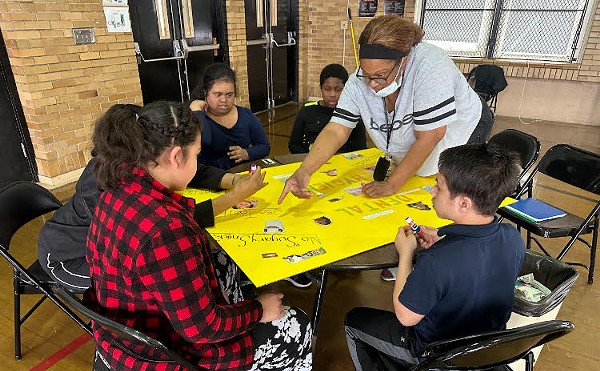A final determination about West Louisville’s wet-dry vote could be
in the works. Meanwhile, things get even weirder on the street
Whether its conclusion pleases Hamdallah “Jimmy” Mohammed, the owner of F & Y Food Mart at 38th and Market in West Louisville, or Metro Councilwoman Cheri Bryant Hamilton, the 5th-district Democrat and “dry” cheerleader, the wet-dry vote currently being hauled through Louisville Metro’s court system will most likely be cited as one of the uglier episodes of the last two years. And both sides essentially claim some form of racial animus is motivating the other.
The group of storeowners fighting the ban, most of whom are Palestinian, say that because of their ethnic background and religious beliefs, they’re scapegoats for a zealous clique of leaders who lack the wherewithal to uproot the real causes of crime, namely the loiterers, stick-up kids and drug dealers.
In part, they are correct.
For starters, the blinkered judgment of the neighborhood church leaders ignited the wrong fire by focusing on the only issue that seems to motivate community activists or journalists in West Louisville: crime. Shielded by ministerial hubris, inquisitions about the logic of connecting alcohol sales to crime statistics were muted. If buying a Bud Light at a particular few convenience stores in the Shawnee neighborhood caused crime in the surrounding area, then permitting alcohol sales in adjacent precincts — simply because residents didn’t volunteer to join the dry movement — makes the vote look like an insincere marriage of gerrymandering and hairsplitting.
Naturally, proponents don’t play it that way.
“The Shawnee community had the nerve and resolve to vote for what they believed,” Hamilton said at one of the “Respect the Vote” rallies held last month. With 86 percent voting to ban alcohol sales, the conviction of Shawnee residents is unquestionable. Certainly the election was an effective rallying cry to mobilize a community fatigued by the drug trade, robbery and homicide. However, believing in something is not equivalent to saying it is the best policy available.
Just as the Palestinian storeowners feel targeted, African Americans living in the Shawnee neighborhood have wondered aloud why their communities are plotted with businesses that saturate neighborhoods with a witch’s brew of alcohol, cigarettes, lottery tickets and unhealthy snack foods.
According to the Louisville Metro Health Department’s 2007 Health Status Assessment Report, African Americans here suffer disproportionately higher rates of lung cancer, heart disease and alcohol abuse. Many of these convenience stores are conduits that aggravate those health problems.
“Health disparities are determined not just by individual choices,” Dr. Adewale Troutman, director of the health department, said in a recent phone interview. “Good health is determined by where you live.”
Troutman told LEO that Louisville is not much different from other cities. “If you go out further east you don’t find these type of stores,” he said. “You find them in poorer communities and communities of color.” Troutman said that employing policy standards like a health impact assessment to monitor new businesses coming into neighborhoods could be effective in beginning to balance the disproportion.
But pegging storeowners as the source of crime is a frustrated community’s lazy strategy, and unnecessarily sensationalist. With a bit more prudence and examination, community leaders would have found that the consequences of these convenience stores — primarily on health matters — are far more devastating than crime statistics alone reveal.
But one cannot blame the ministers at the head of the dry movement for choosing this line of attack. The rawest form of democratic power a neighborhood can wield is the precinct jurisdiction over alcohol sales.
“There’s no other issue besides wet-dry that can be determined by precincts,” said Bill Patteson, a spokesperson for the Jefferson County’s Attorney office. Going that route was far more conclusive and easier than challenging new or old businesses at the Alcohol and Beverage Commission level, which could lead to a dead end in Frankfort. And the maze of zoning committees in Metro provided even less optimism.
Next week, Judge Mary Shaw will hear attorney Teddy Gordon’s appeals on behalf of two storeowners. It could be the final chapter in the ongoing series of appeals, injunctions and restraining orders, leaving the four precincts officially dry.
And with tensions already ratcheted up, a religious overture from a new dry supporter, the Rev. Peter J. Hayes (who doesn’t have Hamilton’s support in the matter), may be the tipping point of discrimination that Palestinian storeowners have warned the courts about. Hayes obtained a fatwa, an edict issued by an Islamic cleric, from the Figh Council of North America.
“If you’re going to kill a woman who names a teddy bear, then stop your Palestinian boys from selling alcohol,” Hayes told LEO.
Contact the writer at
[email protected]





